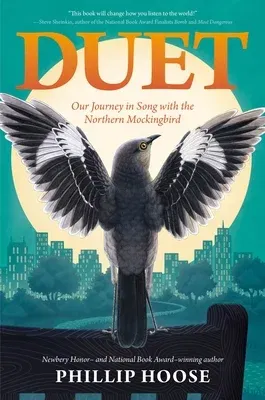The story of the impactful partnership between humans and
mockingbirds, both scientifically and culturally over the centuries,
written for young adults by award-winning nonfiction powerhouse Phil
Hoose.
The Northern mockingbird's brilliant song--a loud, bright, liquid
sampling of musical notes and phrases--has made it a beloved companion
and the official bird of five states. Many of our favorite songs and
poems feature mockingbirds.
Mockingbirds have been companions to humans for centuries. Many Native
American myths and legends feature mockingbirds, often teaching humans
to speak. Thomas Jefferson's mockingbird, "Dick", was the first White
House pet. John James Audubon's portrait of a rattlesnake raiding a
mockingbird's nest sparked outrage in the world of art. Atticus Finch's
somber warning to his children, "Remember, it's a sin to kill a
Mockingbird," is known throughout the world. Some jazz musicians credit
mockingbirds with teaching them a four-note call that says, "Break's
over." And mockingjays--a hybrid between jabberjays and mockers--are a
symbol of the rebel cause in the Hunger Games trilogy.
But in the early 1900s the mocker was plummeting toward extinction. Too
many had been trapped, sold, and caged. Something had to be done. To the
rescue came a powerful and determined group of women.
Now, National Book Award and Newbery honor-winner Phillip Hoose brings
the story of the important and overlooked connection between humans and
mockingbirds--past, present, and future. It is the third volume of his
bird trilogy.
Duet is a study in the power of song. As author Steve Sheinkin puts
it, "This book will change how you listen to the world."

